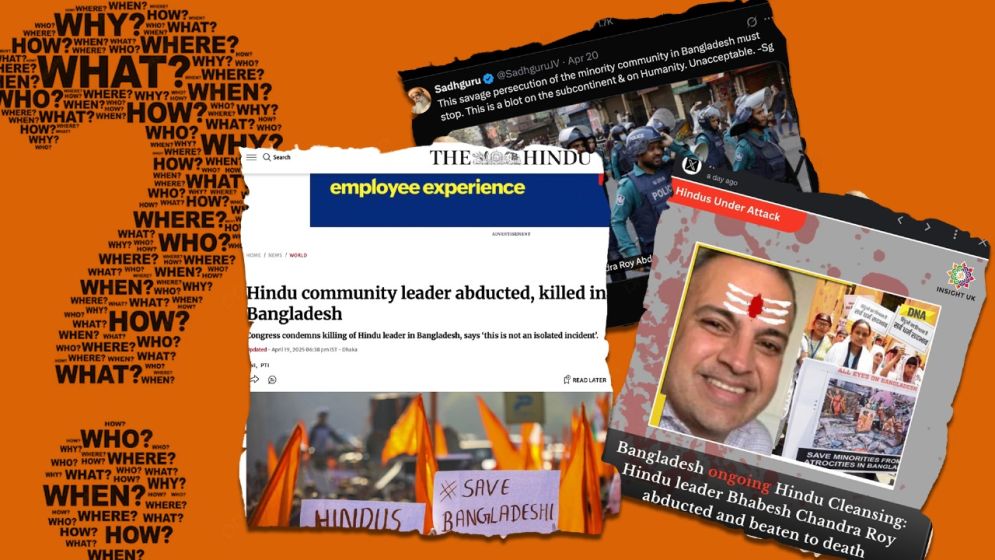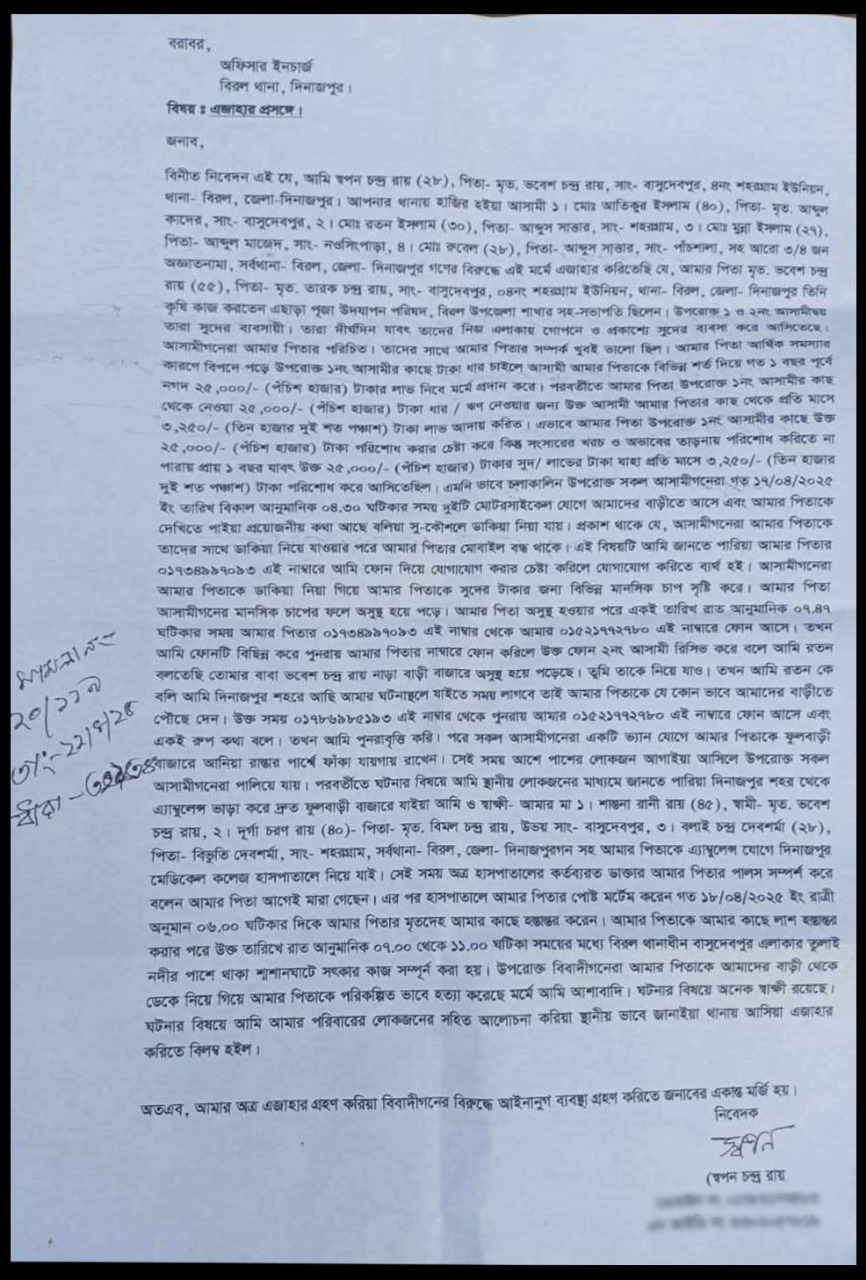Bhabesh Chandra wasn’t beaten to death….so who’s spinning the narrative?

On April 17, Bhabesh Chandra Roy, a Hindu community leader from a small locality in the northern district of Dinajpur, died under what were described as "unusual circumstances."
The incident was initially reported by The Daily Star—Bangladesh’s leading newspaper—as a case of “abduction and being beaten to death.”
The report triggered a strong response from Indian media, which has taken a notably critical stance on developments in Bangladesh since the removal of former Prime Minister Sheikh Hasina.
The narrative being pushed paints the interim government as “oppressive” towards Hindu minorities.
India’s Ministry of External Affairs swiftly condemned the killing, calling it part of a broader “pattern of systematic persecution of Hindu minorities” under the interim administration.
MEA spokesperson Randhir Jaiswal, in a post on X, expressed deep concern, stating: “We have noted with distress the abduction and brutal killing of Shri Bhabesh Chandra Roy, a Hindu minority leader in Bangladesh.”
Citing the initial Daily Star report, leading Indian newspapers ran front-page stories, while TV channels gave the incident prime-time coverage. Several talk shows featured heated panel discussions denouncing the treatment of Hindu minorities in Bangladesh.
The outrage spread rapidly across social media, especially on X, where Hindutva-aligned accounts were particularly vocal.
Even spiritual figures like Sadhguru weighed in, tweeting: “This savage persecution of the minority community in Bangladesh must stop. This is a blot on the subcontinent & on Humanity. Unacceptable.”
This reaction from India came on the heels of a recent statement from Shafiqul Alam, Press Secretary to Bangladesh’s Chief Advisor. Referring to Indian media's unfounded accusations linking Bangladesh to communal violence in Murshidabad over the Waqf Act, Alam remarked that India should instead focus on ensuring the safety and rights of its own minority communities.
Meanwhile, despite the initial outrage, it has come to light that The Daily Star has since removed the original article from its website and dispatched a reporter from Dhaka to independently verify the facts.
According to at least two sources at the
newspaper, local correspondent Kongkon Karmakar’s contract has been terminated
for submitting a report based on “unsubstantiated claims.”
What really happened in Dinajpur?
Bhabesh Chandra, 55, served as the vice-president of the Biral unit of the Bangladesh Puja Udjapan Parishad—a 47-year-old organization responsible for organizing Hindu religious festivals, with branches in nearly every union across the country.
A resident of Basudebpur village, Bhabesh was a farmer by profession. According to his wife, Shantana Rani Roy, he had recently been facing financial difficulties and had taken loans from two local moneylenders—Atiqul Islam and Mohammad Ratan Islam.
His son, Swapan Chandra Roy, 28, filed an ejahar (formal complaint) with Biral Thana in Dinajpur, stating that his father had borrowed Tk 25,000 from Atiqul and Ratan.
As per the ejahar, on April 17, both men came to Bhabesh’s home and took him to a nearby market at around 4:30 PM. Soon after, Bhabesh’s mobile phone was found to be switched off. Around 8 PM, Swapan received a call from Ratan, who said Bhabesh had fallen ill and asked him to come quickly.
Since Swapan was far from the location, he requested Ratan to bring his father home. However, according to the complaint, instead of taking him back, Ratan and others left Bhabesh near Fulbari Bazar and quickly left the scene.
When family members found him, Bhabesh was unconscious. He was rushed to Dinajpur Medical College Hospital, where the attending doctor declared him dead.
Speaking to Bangla Outlook, Abdus Sabur, the officer-in-charge of Biral Thana who is leading the investigation, confirmed that Bhabesh’s death appeared "unusual," but added there was no evidence to suggest he was beaten to death.
“It likely resulted from a heart attack,” Sabur said. “The post-mortem is underway and will determine the exact cause. From my experience handling hundreds of cases, I can say with confidence that there were no signs of physical assault.”
Dinajpur’s Superintendent of Police, Marufat Hossain, echoed that assessment. He told Bangla Outlook that multiple officers were deployed to investigate, and preliminary findings also pointed to a heart attack.
According to two eyewitnesses identified by the police, Bhabesh was seen earlier that evening eating fritters at a roadside stall with Atiqul and Ratan. He was also seen smoking cigarettes and chewing betel leaves mixed with jorda.
Around 7 PM, witnesses said Bhabesh suddenly fell ill during a conversation with the two men. “He collapsed, and they couldn’t detect a pulse,” a source said.
Bangla Outlook also spoke to acting Upazila Nirbahi Officer (UNO) of Biral, Ishtiaq Ahmmed, who visited Bhabesh’s home and met with his family.
“Until the post-mortem results are available, we can’t make any conclusive statements, but there were no visible injuries or signs of assault,” he said. Ishtiaq also noted that law enforcement in the area is on high alert to prevent any communal unrest. “We’ve assured the family of full support and a thorough investigation.”
Meanwhile, Swapan Chandra, who filed the complaint, told Bangla Outlook that his father's death was clearly "not normal." “He left the house in good health, and just a few hours later, we were told he died. That doesn’t add up.”
While acknowledging the police’s observation
that there were no signs of physical harm, Swapan added, “Yes, I’m aware of
that. But intense psychological pressure from the individuals I named in my
ejahar could have played a role in his death.”
Why was the news about his death distorted?
Meanwhile, The Daily Star reporter Kongkon Karmakar authored the initial report claiming that Bhabesh Chandra Roy had been beaten to death. The report was quickly picked up and amplified by Indian media, prompting an immediate response from India’s Ministry of External Affairs.
Bangladesh responded firmly. On April 19, Chief Adviser’s Press Secretary Shafiqul Alam rejected India’s claim, asserting that the interim government is committed to safeguarding the rights of all citizens, regardless of their religious affiliation.
"It is unfortunate that the death of Mr. Bhabesh Chandra Roy has been described as part of a 'pattern of systematic persecution' of Hindu minorities under the interim government," Alam said in a statement to BSS, responding to India’s official remarks. "We reject this baseless claim," he added.
Bangla Outlook spoke with multiple local sources, including journalists, who suggested that Bhabesh’s death was “internationally framed” to serve political interests.
According to them, both Atiqul and Ratan—who are active in local politics—have rivals who sought to exploit the situation by portraying the incident as communal, thereby putting pressure on them.
These sources confirmed that Atiqul and Ratan had been pressing Bhabesh to repay the money he owed, and that stress may have contributed to his deteriorating health.
However, the sudden nature of his death provided their opponents with an opportunity to cast them in a negative light, feeding the narrative that it was a communal attack.
It is believed that Kongkon Karmakar was given this version of events by sources with vested interests, which formed the basis of his now-questioned report.
Bangla Outlook attempted to contact Karmakar by phone for comment, but received no response. The Daily Star also declined to issue an official statement regarding the matter.
—-

